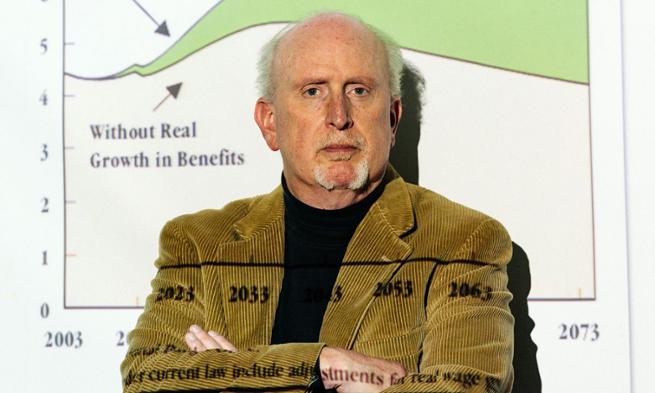Will social security be around when you retire?
Business
Economics professor's Rosser equation says, "Yes"
By Patricia May ('94M)
From Spring/Summer 2014 Madison magazine
In 2005 a group of about 250 business students in seven classes was asked if Social Security would still be around for them to collect upon retirement, particularly, if as many forecast, the system goes "bankrupt." Students resoundingly answered "no," or at least "not much." JMU economist Barkley Rosser disagrees with this assessment.
'People have to understand the sources and learn to identify and sort through the biases. The bias doesn't necessarily mean the information is false; you simply need to listen with an open mind.'
He developed Rosser's equation, the first time in JMU history that an equation has been named for a faculty member.
The equation was first named in 2010 by economist Bruce Webb, who declared it as "something between an inside joke and a tribute to professor Barkley Rosser."
Social Security's future
When annual Social Security Trust Fund report numbers are inserted into the Rosser equation, the results indicate that future recipients will actually receive more in Social Security benefits after inflation than those retiring today, even after the system supposedly goes "bankrupt."
Rosser explains the Social Security Administration ran surpluses from 1983 until very recently, accumulating a positive balance as a result of changes put in place by the bipartisan Greenspan Commission with the goal of "paying for the retirement of the baby boomers." The SSA was the only division of the federal government running a surplus.
The Social Security Administration has begun to cash in the accumulated securities from that surplus. When that balance is exhausted, the system will be "bankrupt," morphing into a "pay as you go" scenario relying strictly on taxes received in succeeding years, assuming there are no changes to the system before then.
However, Rosser's calculations show that even after "bankruptcy," future recipients will fare better with social security than do current recipients. In fact, they would receive about 120 percent of what current recipients are getting in real terms, after inflation.
Rosser says, "Big money is involved here. Many companies want to privatize social security. By stirring up mass hysteria around the issue and convincing everyone that social security is going to fail, changes such as privatizing the system may seem feasible."
He adds, "Young people should not be hysterical about social security; it will be there for them. It may get jerked around a bit; people may have to wait a few years before they become eligible, or the system might experience some smallish cutbacks in future benefits."
Rosser encourages everyone to be more aware of issues regarding the federal budget. "I would urge students to pay attention to details of what is being proposed and what is being discussed. It's important for people to study the issues, figure out what the federal budget is, and what the future deficits are. I know it's not easy to do, but it can be done."
He adds, "All media outlets have their biases and push their agendas. People have to understand the sources and learn to identify and sort through the biases. The bias doesn't necessarily mean the information is false; you simply need to listen with an open mind."
Rosser joined the JMU economics department in 1977, where he has been a professor of economics since 1988 and the Kirby L. Cramer Jr. Professor of Business Administration since 1996. He has published several books and about 150 journal articles, book chapters, and book reviews in a wide variety of sub-fields of economics. He has chaired numerous honors theses and committees, and written hundreds of letters of recommendation for students. "I have always enjoyed interacting with students; I enjoy lecturing and being with students," he says.
Rosser's accolades and awards are numerous, and he served as editor of the Journal of Economic Behavior and Organization from 2001 to 2010. His devotion to JMU students is longstanding in the classroom and in the form of the J. Barkley Rosser Sr. Memorial Economic Scholarship Endowment. Rosser established the scholarship in 1989 in memory of his father, renowned mathematician J. Barkley Rosser Sr., to provide support for a junior undergraduate majoring in economics.
